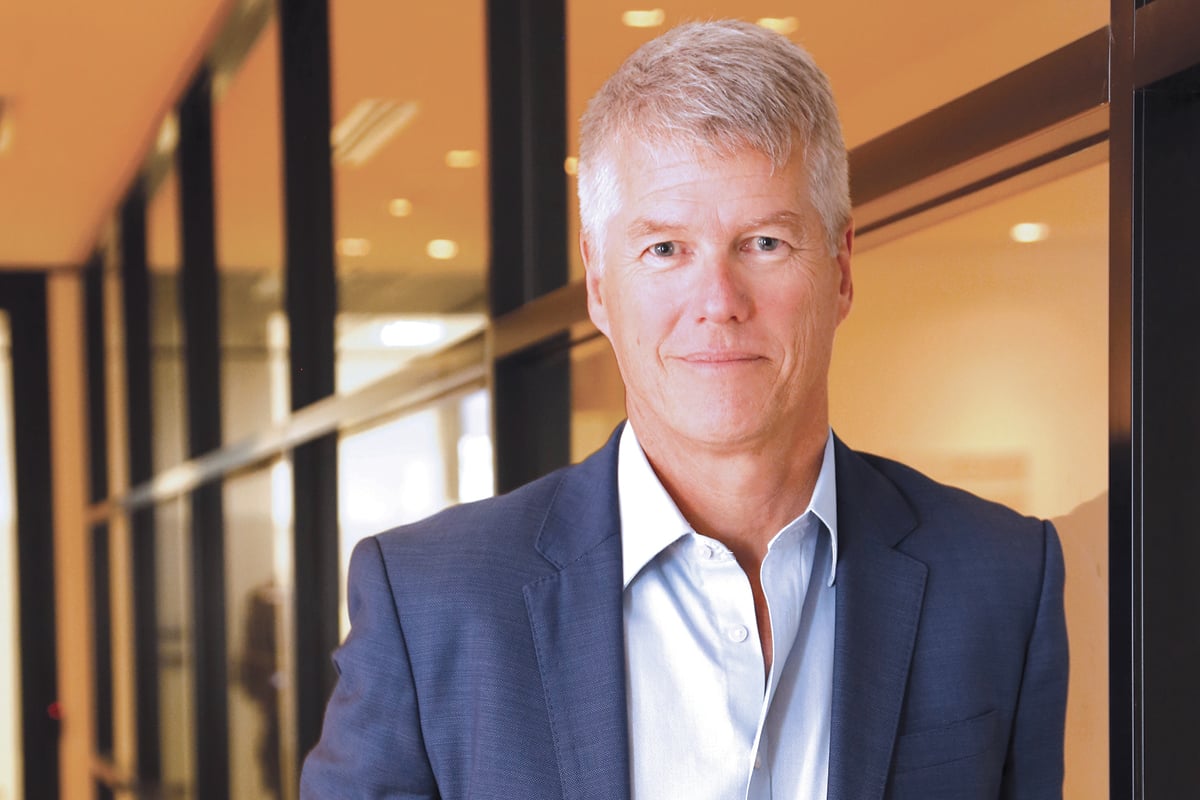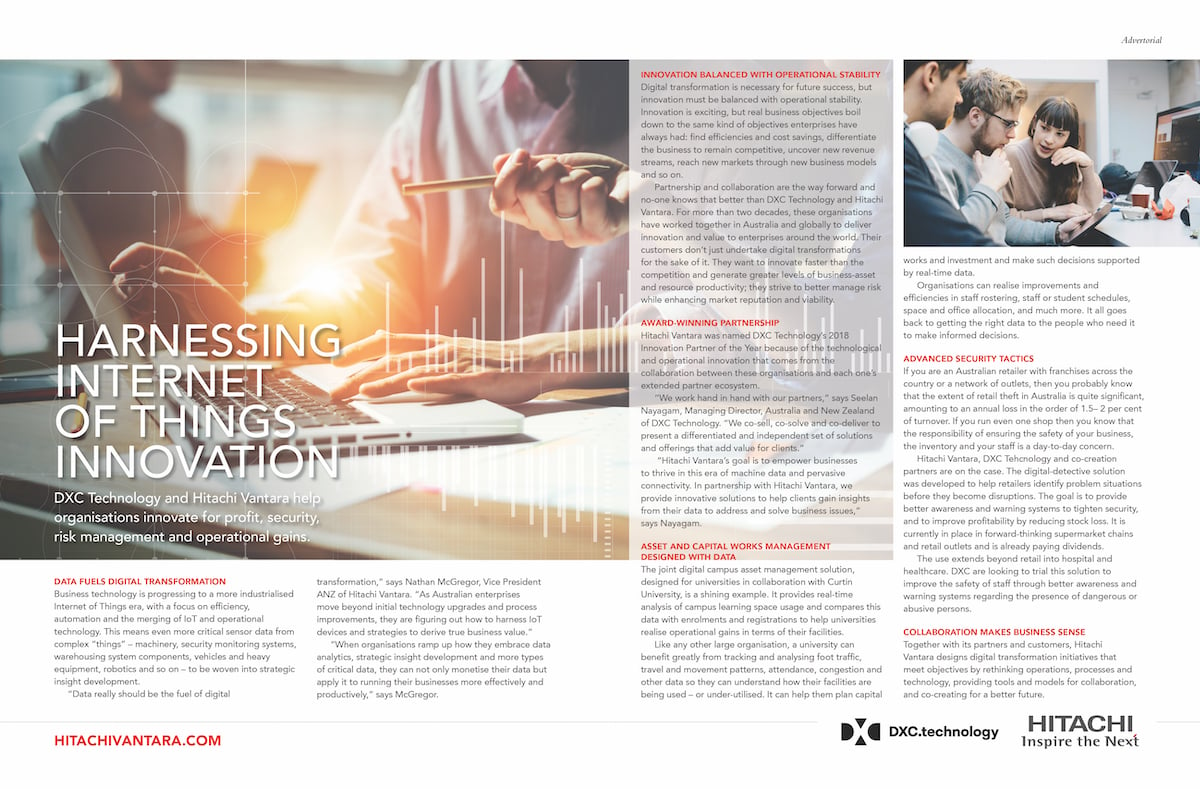For many of the world’s greatest business leaders, their crowning accomplishments are immediately obvious. Mark Zuckerberg, for example, is undoubtedly best known for Facebook, while the Virgin Group and its numerous subsidiaries represent the pinnacle of Sir Richard Branson’s business acumen.

But for some, their most notable work lies just ahead. DXC Technology’s Nick Mescher, senior partner for Digital Transformation – Australia and New Zealand, believes his greatest achievement is yet to come, with the changes in industry moving at a pace never seen before.
“I’ve enjoyed many successes over my 30-plus years in the industry, from assisting start-ups to running large businesses. But the personal ‘why’ that gets me out of bed in the morning is the prolific opportunity to take Australian businesses on a journey, change the way digital transformation is perceived and help them realise the benefits over the short to medium term. Ensuring that DXC is their trusted partner of choice will be my greatest career achievement.”
Nick is no stranger to change. As the CEO of UXC Consulting, he consolidated seven different consultancy firms into one organisation. In 2016, UXC was acquired by CSC and, in 2017, CSC merged with the Enterprise Services division of Hewlett Packard Enterprise to form DXC Technology.
Nick’s experience during this time was invaluable in smoothly integrating the three consulting businesses in ANZ to sit under the global umbrella of DXC Technology.
Nick’s current role represents a departure from the traditional corporate C-suite structure. He is pivotal in enabling the digital evolution of clients, forming an essential conduit between the business and technology sides of organisations.
This is indicative of an increasing class of executives – those concerned with the growing digitalisation of the business world. “The cross-section of business and technology is elevating technology into boardroom discussions,” Nick explains.
“I’m focused on harnessing and adapting global ideas, thoughts and frameworks for businesses of all sizes in the ANZ market. We ensure that we tailor offerings and solutions towards what we see as local nuances to ensure their relevance.”
“I’m focused on harnessing and adapting global ideas, thoughts and frameworks for businesses of all sizes in the ANZ market.”
“I’ve always had a passion for the merging of business and technology, which we now call ‘digital’. That’s what digital is all about. It’s not sitting in a pure technology stack, and it’s not just driving business initiatives. It’s bringing the two together.”

“DXC was formed to lead digital transformation and help our clients thrive on change. Therefore, it’s critical that the roles we create and the experts we engage are leading our clients on the digital journey, which is to a large degree the role I’ve had for 10 years but certainly has now evolved in profile.”
Nick says his position incorporates three roles: evangelist, change agent and collaborator. The first is clear; Nick’s job is to promote the concept of digital transformation and to explain why the market is moving in that direction.
“I’ve always had a passion for the merging of business and technology, which we now call ‘digital’.”
‘Change agent’ refers to more than just effecting evolution within DXC’s clients – it applies to change within DXC itself. Nick believes that without an agile strategy to ensure internal adoption of digital transformation, an organisation runs a serious risk of being left behind.
“At DXC, we are constantly looking for ways to transform ourselves as much as we’re helping our clients transform,” he says.
Finally, as a collaborator, he sees it as his role to encourage partnerships with a range of organisations so as to ensure the creation of a “vibrant digital ecosystem”. Being open-minded about working with partners is critical to pursuing true digital transformation.
“One reason why partnerships are important is due to a shortage of digital resources,” says Nick. “Studies suggest we’re heading into an area where we don’t have enough digitally skilled labour. Corporations will struggle to attract and retain talent, and there will be an increasing requirement for providers like DXC who can help manage the peaks and troughs.”
Nick believes organisations now have less time to adjust to movements in innovation. “These days, any given company may have only six to 12 months to adapt, where once they had as many as five or 10 years. To be able to compete in this rapidly changing market, you’re going to need to leverage external expertise to keep pace,” says Nick.

“It’s tough for organisations to have enough people with an eye to where the market’s going and to keep the cogs of industry running.”
Unlike many corporate strategic reorientations, the digital transformation process is an agile one that doesn’t require long-term programs.
It’s also more flexible, since organisations can enact transformation in “bite-sized chunks”, which means there’s no need to wait until the end of a transformation process for results.
Nick says this offers clients more confidence in their ability to see the process through, while helping them understand the impact of the changes.
Even with this flexibility and agility, it can still be difficult for some organisations to adapt.
Nick believes the greatest challenge for businesses undergoing digital transformation is the cultural adjustment.
He notes that many organisations don’t achieve their full projected benefits due to the organisation not being culturally ready. “I get asked frequently, ‘Where should I start in my digital transformation journey?’” says Nick.
“My answer’s simple – double down on change management. If you’ve already got some change management in place to enact an organisational change, ensure you have the right people who understand the direction and the strategy, then double it. Put more focus on people. You can’t underestimate the impact of true digital transformation across an organisation’s culture.”
“You can’t underestimate the impact of true digital transformation across an organisation.”
As far as Nick is concerned, change has to occur at every level – and there’s an imperative for change to not only happen at the senior level but to be actively promoted and clearly communicated.
Again, the theme of ‘collaboration’ emerges in Nick’s role, since he believes that within the C-suite, digital initiatives need to be a shared responsibility. “The most successful approach is organisation-wide and must be sponsored at the top level,” says Nick.
“Digital is becoming something that can’t be limited to the realm of technology. The technology leader, whether that’s the CIO, the CTO or the CEO, now plays a key role as the co-pilot of initiatives with their C-level peers. Seldom are digital budgets 100% owned by the CIO.”
“What I call ‘the enlightened CIO’ is an individual who sees value in both managing their own budget and assisting others with managing theirs for the betterment of the company. Success is where the CEO and Board set the agenda for the cultural transformation and sponsor the digital transformation, while the other C-levels drive to deliver the specific initiatives hand-in-hand with the technology leader.”
“Success is where the CEO and Board set the agenda for the cultural transformation and sponsor the digital transformation.”
To embody this view, Nick recently completed his Australian Institute of Company Directors training and graduated; subsequently, he was appointed as a Non-Executive Director of Guide Dogs Victoria.
Combining this new role with his day-to-day responsibilities has given Nick the added perspective of helping drive a digital agenda from a Board position.
As the face of DXC in promoting digital transformation to organisations in Australia and New Zealand, Nick has a clear strategy for working with businesses. Establishing a common ground for success on both an organisational and personal level is crucial.
After all, it is individuals who make up an organisation, and each individual needs to understand how this evolution is something they can contribute to, believe in and be successful with.
In establishing dialogue, Nick makes sure to engage and gain rapport with clients; he emphasises that you can’t talk down or up to a client. Instead, there’s a need to understand their position and talk to them on the same level.
Meanwhile, disagreements are met by taking the time to focus on the client’s perspective, their business and their digital challenges. From there, being realistic and practical about implementation makes the process of digital transformation much smoother.

A key enabler for a successful digital transformation is scaling. “In speaking to clients, one of the biggest barriers is that while they recognise digital transformation as a clear priority, they remain aware of the challenges involved in implementing change at scale.”
“Digital transformation programs often have success with generating a proof of concept, but scaling these into organisation-wide adoptions requires a different skill set and strong enterprise delivery discipline.”
Nick’s role within DXC is something he’s always had an affinity for. “Whether it is an in-built trait or a learned one, I have always had the ability to translate technology innovation into business language and benefits,” he says.
“I’ve listened to a technologist explain a capability, solution or challenge and then been able to ensure this is understood by the business at all levels. It’s something I’ve always been able to do.”
Through his career, Nick has developed a firsthand familiarity across all sides of business; and while he’s always been focused on the intersection of technology and business, he firmly believes digital transformation needs to be considered enterprise-wide from the outset.
“Taking a holistic view towards technology and business will ensure a greater rate of success for digital transformations across the enterprise. It didn’t take us long to realise the full benefits of what a digital transformation can offer, and I feel privileged in my role to be guiding businesses in Australia and New Zealand on this journey.”
Proudly supported by:



